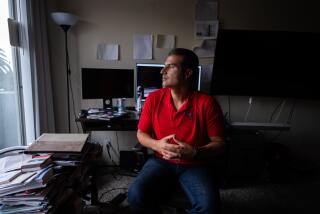Revenge is spark behind a Somali teen’s militancy
- Share via
DJIBOUTI — A year ago, Bashir Yusuf was a schoolboy who dreamed of becoming a doctor. Now the 15-year-old Somali dreams only of revenge and his own death.
His transformation from junior high student to Islamist fighter with blood on his hands is a bitter legacy of the cycle of violence that began in Somalia a year before Bashir was born. Just as the U.S.-led invasion of Iraq has become a recruiting tool for Al Qaeda, the presence of thousands of Ethiopian troops in Somalia is creating a generation of religious warriors such as Bashir, radicalized by a daily diet of violence.
Today, Bashir is recuperating in the neighboring country of Djibouti after losing his hand during an attack on his insurgent hide-out.
The militant journey that brought him to a hospital here began in March, when an Ethiopian missile landed on his family’s home in Mogadishu, the capital of Somalia.
Three months earlier, Ethiopian troops had crossed the border to help Somalia’s weak transitional government defeat an alliance of religious leaders known as the Islamic Courts Union that had seized control of Mogadishu. The brief war brought the capital under government control, but thousands of Ethiopian troops remain in Somalia to help the government battle an insurgency of Islamic fighters and hostile clans.
More than 1,000 civilians are believed to have died in the fighting this year, and 450,000 have been displaced. Many have been cut off from food, healthcare and other aid.
Bashir’s family was asleep when the missile hit. As he escaped from the rubble, he saw the smashed bodies of his father, an imam at the local mosque, his brother and two sisters.
Helping his wounded mother and grandmother, Bashir fled with them to a displacement camp about 10 miles outside the capital. The traumatized family survived on handouts from a local doctor and private aid groups.
At night, Bashir said, he would lie awake in the camp, his mind drifting between two courses of action: suicide or revenge.
“I saw my future was dark,” he said. “I lost hope.” His dreams of becoming a doctor had vanished. Even finishing high school seemed unlikely now. Condolence visits from friends and family only served to rekindle the pain and prolong his anger.
He decided upon revenge.
Bashir had admired the Islamic Courts Union since the group chased U.S.-backed warlords out of Mogadishu in June 2006. American officials have accused the Islamists of having links to terrorist groups.
Last December, when an invasion of Ethiopian troops appeared likely, Bashir and some friends ditched class one day and secretly visited an Islamist training camp. They signed a “jihad book” vowing to take up arms against the Ethiopians.
But he described the move as a childhood dare, a result of peer pressure. He hadn’t followed through on the pledge and said he didn’t dare tell his parents. His father, he believed, would never have approved.
By April, living in the displacement camp, Bashir said, he was ready to fulfill that promise after all.
“I stopped sleeping,” he said. “I read the Koran more and more. I decided to go back to Mogadishu and fight the Ethiopians.”
It didn’t take long to hook up with an underground insurgency group known as Shabab, a militant wing of the Islamic Courts Union that has claimed responsibility for many of the bombings and assassinations in Mogadishu, including the killing of an Italian nun in 2006. On its website, the group has pledged its allegiance to Al Qaeda.
Within two weeks, Bashir said, he was getting lessons in guerrilla warfare and religion. If he died as a “martyr,” he would be rewarded in heaven with 70 virgin brides, Bashir said he was told.
He got a pistol and was assigned to a cell that included seven other young men. Different teams received different orders. Some were responsible for face-to-face assassinations. Others handled roadside bombs or mortar attacks.
Bashir’s team was tagged to throw hand grenades at Ethiopian or government soldiers in Mogadishu’s Bakara market.
“One of us would be assigned to do the deed, while the others would defend him if attacked,” Bashir said. “We used a code language.”
They were paid for every attack. He would get $20 for every grenade he threw and an additional $30 if it killed a soldier. Planting a roadside bomb and mortar attacks pay $100. “The money is a motivation,” Bashir said.
He refused to say how many people he had killed, but said he had “avenged” the deaths of his father and siblings. “As my family cried,” he said, “I have caused many Ethiopian families to cry.”
He has sent much of the money he received to his mother, he said. His mother, he said, approves.
But Bashir has paid a price for his choices. He was shot twice during gunfights with government soldiers and lost his hand during a rocket-propelled-grenade attack against an insurgent hide-out.
When recalling some of his fellow young insurgents who were killed, he began to cry. “They are in paradise,” he said. “I’m not as lucky as they are.”
He said his injuries were proof of his commitment. “It’s a certificate of jihad,” Bashir said. Once he has recovered, he said, he plans to return to Somalia, using his remaining hand to keep throwing grenades.
He no longer thinks about school. He has no plans to marry. Instead, his focus is on what he calls the ultimate certificate of jihad: death.
More to Read
Sign up for Essential California
The most important California stories and recommendations in your inbox every morning.
You may occasionally receive promotional content from the Los Angeles Times.










